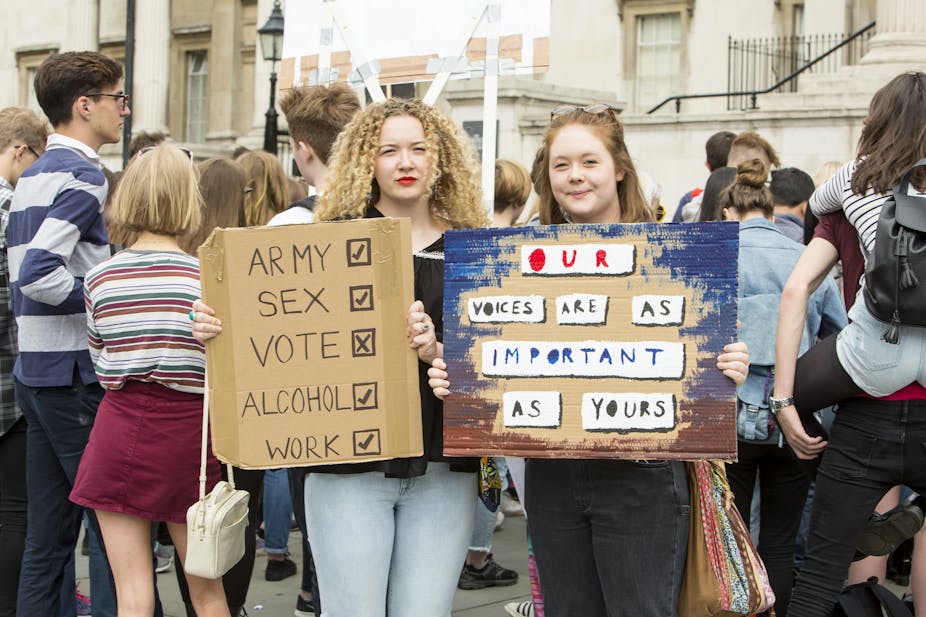The announcement that 16 and 17-year-olds in Wales will be given the right to vote in local council elections comes as part of a wider package of proposals to encourage greater participation in Welsh democracy. But this is not an isolated move. The partial lowering is part of an incremental shift towards the introduction of “votes at 16” for all elections in the UK. It is likely that 16 and 17-year-olds will soon be allowed to vote in Welsh Assembly elections too, following the recommendations of an expert panel in December 2017.
So, if Wales is doing it – and Scotland already allows 16 and 17-year-olds to vote – then why can’t the UK as a whole lower the voting age? Unfortunately it is not as easy as sending out a few extra ballot papers.
Voting age reform continues to divide opinion in Westminster and among the public. In part, this reflect uncertainties over the implications of “votes at 16” which neither supporters nor opponents of reform have fully addressed.
The proposition that reducing the voting age will, on its own, increase political engagement and promote voting as a lifelong habit is questionable. The 2014 Scottish independence referendum indicated that early enfranchisement had a positive effect on the democratic literacy, engagement and participation of young Scots compared with their peers in the rest of the UK. But the full extent to which it has radically altered democratic behaviour of younger Scottish voters is not yet proven.
Although 75% of enfranchised under-18s voted in the 2014 referendum, this was 10% lower than the overall turnout figure. Subsequent Scottish parliament and local elections have seen this differentiation in turnout persist. The differences in participation in the referendum and subsequent elections suggest voting has not become a habit for a quite a few of those who were aged 16-17 when they voted in 2014 as 18 to 24-year-olds.
Ready to vote?
Debates about voting age reform often draw attention to the uncertainty over when someone transitions from being a child to an adult. There is no single age at which a young citizen accumulates all the responsibilities and rights of an adult citizen. Meanwhile new research suggests that adolescence, for some people, can extend from the age of 10 to as old as 24. If 16-year-olds are old enough to vote, then we need to start considering other age thresholds – such as whether a 16-year-old should still be prohibited from serving on a jury, standing as a candidate in an election, driving, or buying an alcoholic drink.

We should also consider how young people are being politically socialised. Citizenship and political education in schools and colleges differs in each nation. But overall it lacks consistency in quality and availability. Not all young people are offered sufficient opportunities to learn about politics or gain the necessary democratic skills and experiences prior to gaining the right to vote – whatever age they may be.
Previous voting age reductions in the UK show that development of political education tends to follow rather than precede reform. When it was lowered in 1969 from 21 to 18, it took nearly 30 years to introduce citizenship education in schools and colleges across the UK. In Scotland there has yet to be significant change in the provision of political education in schools.
We should also assess whether the lack of electoral rights for 16 and 17-year-olds in England and Northern Ireland means there is a “glaring constitutional injustice”. While the exclusion of all under-18s from voting in Westminster elections might be an affront to some, the fact that some states accommodate different voting ages for national and local elections is equally as important. A UK-wide conversation on voting age in an increasingly devolved state is overdue.
Assess the evidence
Voting age reform is not by itself a panacea to questions of youth democratic disengagement. Debate regarding the extent to which the 2017 UK general election was a “Youthquake” has highlighted that participation goes beyond the act of voting. Addressing the causes of youth political disengagement takes more than a referendum, a change in party leadership, or even a reduction in the voting age.
We have long said that the consideration of voting age reform needs to be based on evidence. It cannot be a product of politicised and binary argument.
We are now leading a UK-wide project which will, for the first time, analyse both historical and contemporary evidence in the UK and internationally concerning voting age reform, youth democratic participation, and the rights and responsibilities of youth and adult citizenship.
By adopting an evidence-based approach that draws on the views and experiences of citizens of all ages across the country, we seek to help create policies that encourage all young people to develop a lifelong habit for voting and participating in our democracy.

